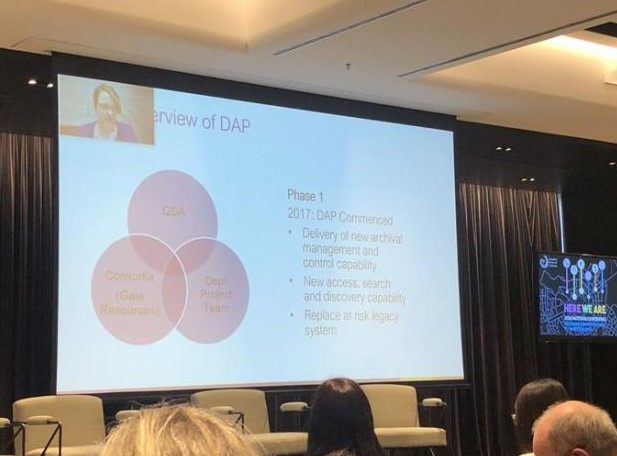Sarah and I got the opportunity to go to the Australian Society of Archives conference in Canberra last month, and it was great to be back in a face-to-face conference with like minded people. It was only my second trip outside “fortress WA” since COVID locked us all down three years ago (Sarah had less to travel – now she’s our “Canberra Office”)!
It’s wonderful when you can actually find your tribe in this rather interesting world, and I think both Sarah and I felt like we were well accepted into the archival community through these events. It’s great to be talking about all sorts of things and attending talks that expand on our knowledge of this area, and to be able to have those collegiate discussions in the breaks with contacts new and old. It was also great to have an environmentally themed keynote (and a few other sessions), since we are actively trying to bring the knowledge of archiving and digital preservation to the environmental technology side of our business. It was extra special to see our colleagues and clients from the Queensland State Archives present on the Digital Archiving program that we have been working on for a long time (2017 feels like a long time ago? A lot has happened since then).

Josephine Marsh presenting (virtually) on the Digital Archiving Program for Queensland State Archives
The content of this year’s conference had us thinking about a few key takeaway points:, including the fact that smaller archives are still struggling with their remit in a very resource constrained environment and that there are a lot of organisations starting on some sort of journey. There were also a few of “the usual” presentations from the community – in these difficult times it seems that innovation is lagging a bit, but we did have a few conversations around Artificial Intelligence in the archives, following on from a previous blog and our work with transcription. However, in watching these talks, the most pressing thing that we saw was a need for digital literacy and digital education amongst the community.
Digital literacy and digital education across a sector is something that I remember working through in my time with a different industry, the spatial industry. A key segment of that community were cartographers, focusing on making maps, and the rise of digital technologies means that those positions were considered to be “under threat” from people with backgrounds in technology. They were facing a very real change in that some of the profession was ‘stuck’ with old skillsets.
In archives, we face a similar challenge. As archives embrace the digital, we need to work on building digital literacy and digital educational programs that will help our archivists build the skills that they will need to be archivists into the future. This is readily transferable – the mindset of someone assessing a box of paper versus assessing a hard drive of documents is the same, but the skills that are needed to do it are the things that we can develop as a community. Sarah and I came up with a bunch of ideas for digital archival training and we will be working more on that as part of our strategy for the next year, and approaching some of our archival training organisations as well.
It was great to be back with our tribe, and for me it was great to be back in Canberra to meet a range of colleagues face to face – the next one is all about “Rising to our Challenges” – so we’ll put a few challenges out there for that conference as well, and look forward to meeting everyone again in Melbourne!
In the meantime, if you’d like to know more, start a conversation on our social media platforms – Twitter, LinkedIn or Facebook or send us an email.
Piers


Comments are closed.